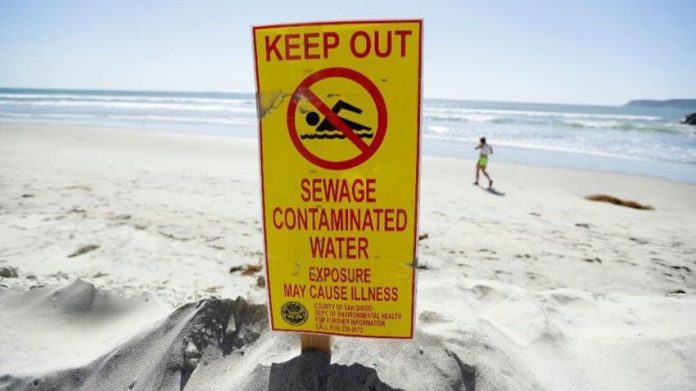Large amounts of sewage-contaminated runoff moving into southern California from the Tijuana river in Mexico have forced San Diego authorities to prohibit swimming on the entire shoreline of Imperial Beach.
A beach closure has been in place for months at the southern end of the city’s coastline but the San Diego County Department of Environment Health expanded the closure Sunday after recent rains sent yet more polluted water across the border.
The beach closure will remain in place until testing shows that the water is safe.
According to officials, more than 110 million gallons (416.4 million liters) of toxic storm water has flowed north from Mexico since April.
“The sad thing is that with just a quarter inch of rain . . . [contaminated water] can begin to flow and impact our beaches,” said Paloma Aguirre, director of the environmental NGO Wildcoast.
“Every time that it rains, here in Imperial Beach we have the closure of beaches caused by the Tijuana river. The state of Baja California simply hasn’t done enough [to stop the flow of contaminated water],” she added.
Aguirre said last year that the Tijuana wastewater treatment plant, known as San Antonio de los Buenos, or Punta Bandera, is dumping 1,750 liters of untreated sewage into the Pacific Ocean per second.
Before the expanded closure was announced, Imperial Beach resident Patricio Amores told broadcaster Telemundo 20 that he wouldn’t risk swimming in the ocean due to the possibility of catching a contamination-related illness.
Local residents holding signs that read “stop the poop” attended a rally Sunday morning to demand that officials do more to stop the ongoing pollution problem.
In 2017, more than 50 United States border patrol agents became ill after being exposed to contaminants while working in the vicinity of the border, while last year the state of California and the cities of Imperial Beach and Chula Vista sued the United States government over the recurring flows of polluted water from Mexico.
The plaintiffs would like to see a beefed-up diversion system and funding for sewage infrastructure in Tijuana, The San Diego Union-Tribune reported.
Experts and officials say that hundreds of millions of dollars in infrastructure spending is needed to stop water pollution affecting the Pacific Ocean off the coast of Southern California.
Beaches on the Mexican side of the border have also been closed intermittently due to high pollution levels.
To stop wastewater contaminating the beaches of Rosarito, a city 20 kilometers south of Tijuana, a candidate for mayor believes that another treatment plant is needed.
Dora Esquivel Machado, who will represent the Institutional Revolutionary Party at elections this Sunday, said that untreated wastewater flows to Rosarito from neighborhoods in the east of Tijuana.
“We already have one [plant] but it’s not enough because it’s in the rural part of Rosarito. We need one on the central side,” she said.
Source: Telemundo 20 (sp), CBS News (en), The San Diego Union-Tribune (en), El Sol de Tijuana (sp)
